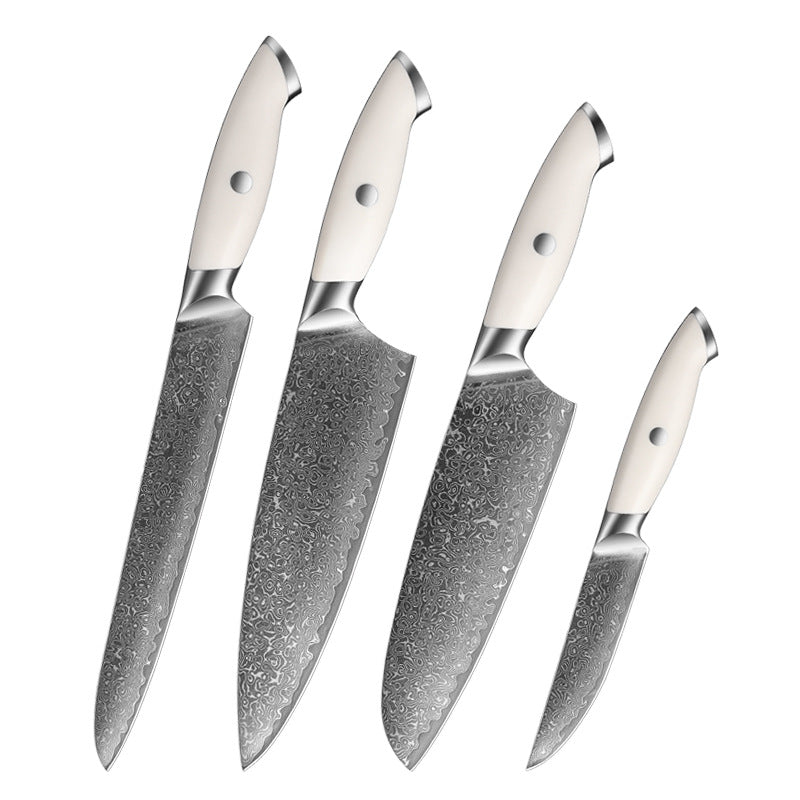There are two kinds of discussions on this topic online, one thinks that dishwashers are the liberator of kitchen knives, and the other thinks why not?Today we will openly talk about the relationship between kitchen knives and dishwashers. Based on our experience in the kitchen knife industry, the opinion is that dishwashers should not be considered boon.

Conclusion first:All metal kitchen knives are not dishwasher safe. Among them:
- Carbon steel kitchen knives should never go into the dishwasher.
- For non-single material sandwich steel knives or Damascus knives must not be put into the dishwasher.
- All knives with non-composite handles (such as wood, horn, bone, etc.) must not go in the dishwasher.
- Kitchen knives with a single metal blade + composite (plastic) handle can be washed in a dishwasher, but hand washing is still recommended.
So why can't so many kitchen knives go into the dishwasher? Let's start by taking a look at what's in the dishwasher and what's going on in the dishwasher when it's working.
Dishwasher work must use special detergents. Dishwasher cleaners are more effective than regular cleaners, in part because of the salt used in them. And salt is extremely corrosive to steel (even for most stainless steels), which is why most steels corrode quickly in seawater. An example is to find an iron pot at home and put concentrated salt water in it for a few days to see what the result is. So for those carbon steel knives that will rust if they are not dried immediately after use, putting them in the dishwasher is tantamount to suicide.
At this time, some people will say that my sandwich steel knife has a good anti-rust ability of both materials, so I am definitely not afraid of the corrosion of the dishwasher! Sorry to tell you this is wrong. It's fine if the sandwich steel or Damascus steel is taken apart and put into the dishwasher separately, but unfortunately they stick together. so what?
Let's take a look at what happens inside the dishwasher when it works: the high-pressure water flushes, the detergent dissolves and the water flow repeatedly hits the surface of the soaking utensils, and at the same time heats up.
Corrosion
Those who have studied chemistry should have heard of a reaction called "electrochemical corrosion". That is, corrosion occurs when two dissimilar metals are spliced together and immersed in an electrolyte. The structure of sandwich steel and Damascus steel happens to be the connection of different metals, and the highly corrosive salt in the detergent forms an electrolyte solution in the water, and the dishwasher kindly heats the environment - greatly accelerating the reaction process . Simply put, your Damascus knife becomes a primary battery in the dishwasher. Therefore, even if the two materials themselves have a good anti-rust ability of laminated steel knives or Damascus steel, once they enter the dishwasher, it is like pressing a suicide switch, which will quickly produce rust and damage the knives.
Deformed
At the same time, because the dishwasher basically has a strong heating energy, and the expansion coefficients of different metals are different, due to the repeated expansion and contraction of the internal stress, the sandwich steel or Damascus steel originally attached together will be accelerated and damaged, resulting in bending deformation or even complete damage.
Handle
As for the knife handle materials such as wood, bone and horny, it will quickly fade, become brittle, deform, and even be directly damaged under the environment of the dishwasher.
The only ones that can go in the dishwasher are the current kitchen knives with mainstream stainless steel blades and synthetic handles (eg 1.4116+POM). However, although these types of knives will not suffer as much damage in the dishwasher as the above ones, the corrosion ability inside the dishwasher cannot be underestimated: the damage on the flat area of the blade is not obvious, but there will still be relatively large trauma in the edge area.
Another point is that other people on the Internet often say that due to the impact of water flow inside the dishwasher, it is easy to cause the knives to collide internally, causing damage to the knives themselves or other utensils.
All in all, the higher the carbon content, the greater the risk of rusting, so for sharp Fat carbon steel like Damascus steel knives, it's definitely not dishwasher safe.

Therefore, although the dishwasher is a treasure that definitely improves the quality of life, it is not friendly to the oldest tool of human beings - the knife. In order to cherish your treasured knives and make them perform at their best for longer, it is recommended that all kitchen knives be hand washed after use.
